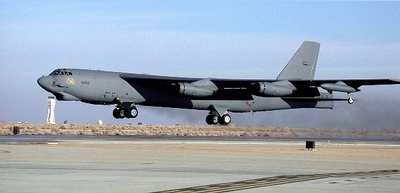Application, Oversight Have Changed "Dramatically"
 Prioritization and "incredible
attention to detail" have restored "nuclear surety" in the Air
Force, the general in charge of the service's nuclear program said
at Minot Air Force Base last week. Nuclear surety is the
equipment, people and processes aimed at ensuring the safety,
security, reliability and control of nuclear weapons.
Prioritization and "incredible
attention to detail" have restored "nuclear surety" in the Air
Force, the general in charge of the service's nuclear program said
at Minot Air Force Base last week. Nuclear surety is the
equipment, people and processes aimed at ensuring the safety,
security, reliability and control of nuclear weapons.
After an erosion of the nuclear process that began at the end of
the Cold War, Maj. Gen. Roger Burg, commander of the 20th Air
Force, said Thursday he feels the service is back on track, even
though the required standards to pass a nuclear surety inspection
have never changed. What is different, he said, is how the service
has applied the standards.
"I will say our application of those standards has changed
dramatically," Burg said. "And our oversight of any problems
identified in the inspections has changed dramatically."
It wasn't until a B-52 bomber from Minot Air Force Base flew
nuclear-tipped missiles cross-country to Barksdale Air Force Base,
LA in October 2007 that nuclear surety became a newsworthy topic,
Burg said.
"An equally well-publicized event that occurred several years
earlier ... involved the [intercontinental ballistic missile] force
[and] the fuses that were erroneously sent to Taiwan," he said. "I
think it rightly made all of us question how could such a thing
happen."
The fuses were shipped to Taiwan from Utah in August 2006.
These are the types of incidents nuclear surety is designed to
prevent.
A nuclear surety inspection for an ICBM or bomber unit is a
broad, intrusive type of inspection, Burg said. Hundreds of areas
might be inspected and each area may have hundreds or even
thousands of individual pieces of equipment, records, and
activities to be inspected.
After the Cold War, Air Force leaders decided to shorten the
inspection time frame and decrease the size of its inspection team.
Instead of inspecting everything, they began taking representative
samples, Burg said.
"It wasn't an intent to say, 'Let's not take care of this
business,'" he said. "It was an intent to say, 'How can we do this
business more efficiently?"
The 2007 and 2008 incidents prompted the Air Force to resume 100
percent inspections, Burg added. That includes personnel medical
records in addition to equipment and activity logs.
"One of our key areas is looking at the Personnel Reliability
Program, which is how we maintain confidence in the people who are
working around nuclear weapons," he said. "In the past, we might
inspect 20 percent of the medical and personnel records of people
associated with a certain unit.
"You'll have thousands of potential points [to inspect], any one
of which, if found to be deficient in a critical way, could lead to
the finding of an unsatisfactory for the wing," Burg added.
Deficiencies receive immediate attention, he said.
The process of maintaining nuclear surety has become the top Air
Force priority, Navy Adm. Mike Mullen, chairman of the Joint Chiefs
of Staff noted during his visit this week here. The chairman toured
several sites including the weapons storage area and a missile
maintenance trainer.
The Air Force is reorganizing to better support the nuclear
enterprise, Burg said. But inspections will get a unit only so
far.
"You do not make an organization excellent by inspecting it," he
said. "You make it excellent by supporting it with priority, with
resources, with people, with experience. That's what the Air Force
is doing with these nuclear units now."

Burg added that he's OK with inspections turning up deficiencies
despite the goal of achieving excellence.
"I'm never satisfied that ... we're getting better because we're
not finding fewer problems," he said. "[What] we're not finding now
indicates an incredible attention to detail."
(Aero-News thanks Samantha L. Quigley, American Forces Press
Service)
 ANN's Daily Aero-Linx (04.15.24)
ANN's Daily Aero-Linx (04.15.24) Classic Aero-TV: 'No Other Options' -- The Israeli Air Force's Danny Shapira
Classic Aero-TV: 'No Other Options' -- The Israeli Air Force's Danny Shapira Aero-News: Quote of the Day (04.15.24)
Aero-News: Quote of the Day (04.15.24) Airborne 04.16.24: RV Update, Affordable Flying Expo, Diamond Lil
Airborne 04.16.24: RV Update, Affordable Flying Expo, Diamond Lil ANN's Daily Aero-Term (04.16.24): Chart Supplement US
ANN's Daily Aero-Term (04.16.24): Chart Supplement US




